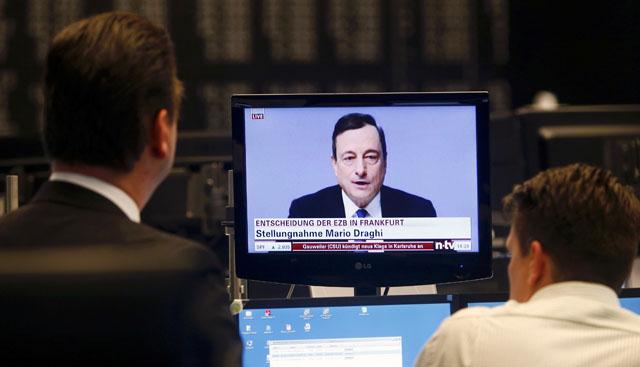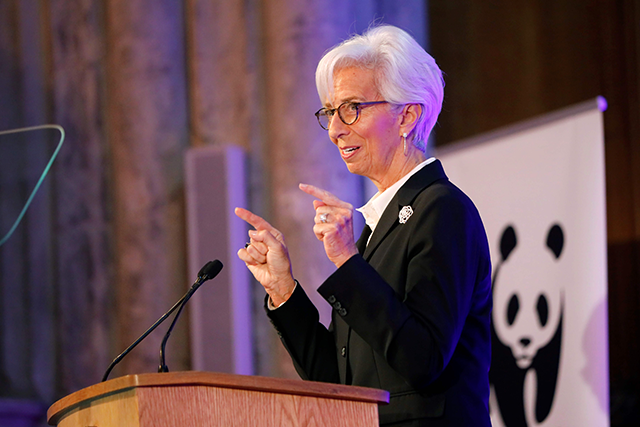You are here
European Central Bank launches one trillion euros rescue plan
By Reuters - Jan 22,2015 - Last updated at Jan 22,2015

FRANKFURT — The European Central Bank (ECB) took the ultimate policy leap on Thursday, launching a government bond-buying programme which will pump hundreds of billions in new money into a sagging eurozone economy.
The ECB said it would purchase sovereign debt from this March until the end of September 2016, despite opposition from Germany's Bundesbank and concerns in Berlin that it could allow spendthrift countries to slacken economic reforms.
Together with existing schemes to buy private debt and funnel hundreds of billions of euros in cheap loans to banks, the new quantitative easing (QE) programme will release 60 billion euros ($68 billion) a month into the economy, ECB President Mario Draghi indicated.
By September next year, more than 1 trillion euros will have been created under the QE, the ECB's last remaining major policy option for reviving economic growth and warding off deflation.
The flood of money impressed markets: The euro fell more than two US cents to $1.14108 on the announcement, and European shares hit seven-year highs.
"All eyes were on Mario Draghi and he has delivered a bigger bazooka than investors were expecting," said Mauro Vittorangeli, a fixed income specialist at Allianz Global Investors, adding that the news marked "an historic crossroads for European markets".
The ECB and the central banks of eurozone countries will buy up bonds in proportion to its "capital key", meaning more debt will be scooped up from the biggest economies such as Germany than from small member states such as Ireland.
The prospect of dramatic ECB action had already prompted the Swiss central bank to abandon its cap on the franc against the euro. Denmark cut its main policy interest rate on Thursday for the second time this week after the ECB announcement, aiming to defend the Danish crown's peg to the euro.
Draghi has had to balance the need for action to lift the eurozone economy out of its torpor against German concerns about risk-sharing and that it might be left to foot the bill.
Will it work?
Economists noted that Draghi had said only 20 per cent of purchases would be the responsibility of the ECB. This means the bulk of any potential losses, should a eurozone government default on its debt, would fall on national central banks.
Critics say this casts doubt over the unity of the eurozone and its principle of solidarity, and countries with already high debts could find themselves in yet deeper water.
"It is counterproductive to shift the risks of monetary policy to the national central banks," said former ECB policy maker Athanasios Orphanides. "It does not promote a single monetary policy. This path towards Balkanisation of monetary policy would signal that the ECB is preparing for a break-up of the euro."
Tensions broke out as the ECB's meeting got under way with French Finance Minister Michel Sapin firing a broadside at Berlin.
"The Germans have taught us to respect the independence of the European Central Bank," he told France Info radio. "They must remember that themselves."
A German lawyer who has been prominent in attempts to halt eurozone bailouts said he was already preparing a legal complaint against the bond-buying programme.
Draghi said the ECB's Governing Council had been unanimous in agreeing that the step to print money was legally sound. There was a large majority on the need to trigger it now, "so large that we didn't need to take a vote".
"There was a consensus on risk-sharing set at 20 per cent and 80 per cent on a no-risk-sharing basis," he added.
One eurozone central banking source said five policy makers opposed the expanded asset-purchase plan: The central bank chiefs of Germany, the Netherlands, Austria and Estonia, along with executive board member Sabine Lautenschlaeger, a German.
Guntram Wolff, head of the Bruegel think tank, said the plan's size was impressive. "But the ECB has given the signal... that its monetary policy is not a single one. That's a bad signal to markets and a bad signal to everybody in the eurozone."
The ECB is trying to push eurozone annual inflation back up to its target of just below 2 per cent; consumer prices fell last month, raising fears of a Japanese-style deflationary spiral. But there are doubts, and not only in Germany, over whether printing fresh money will work.
Most eurozone government bond yields are at ultra-low levels and the euro had already dropped sharply against the dollar. Lower borrowing costs and a weaker currency could both help to boost economic growth but there is a question about how much further either can fall.
Asked if the ECB had a Plan B, Draghi responded: "We just presented Plan A, and we have Plan A. Period."
The ECB could create the basis for growth, he said, but he put the onus on governments to follow.
"For growth to pick up... you need structural reforms," he stressed. "It's now up to the governments to implement these structural reforms. The more they do, the more effective will be our monetary policy."
Draghi was echoing the view of German Chancellor Angela Merkel, who said: "Regardless of what the ECB does, it should not obscure the fact that the real growth impulses must come from conditions set by the politicians."
A plunge in the price of oil has thrown central bankers into a spin worldwide. Canada cut the cost of borrowing out of the blue on Wednesday while two rate setters at the Bank of England dropped calls for tighter monetary policy as inflation has evaporated in Britain.
The ECB has already cut interest rates to record lows. Earlier, it left its main refinancing rate, which determines the cost of eurozone credit, at 0.05 per cent.
Greece and Cyprus, which remain under European Union (EU)/International Monetary Fund (IMF) bailout programmes, will be eligible for the ECB programme but subject to stricter conditions.
"Some additional eligibility criteria will be applied in the case of countries under an EU/IMF adjustment programme," Draghi said.
The move comes just three days before an election in Greece where anti-bailout opposition party Syriza is on track to gain roughly a third of the vote.
Related Articles
FRANKFURT AM MAIN — European Central Bank (ECB) governors are expected to refrain from doling out fresh stimulus medicine, hoping EU leaders
FRANKFURT AM MAIN — The European Central Bank (ECB) is widely expected on Thursday to lower negative interest rates even further, and possib
PARIS — The European Central Bank's (ECB) plan to buy corporate bonds to help the eurozone economy is boosting the private-sector debt marke

















